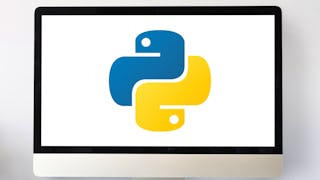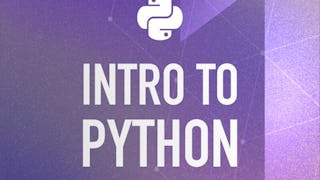This is the second of eight courses in the Google Advanced Data Analytics Certificate. The Python programming language is a powerful tool for data analysis. In this course, you’ll learn the basic concepts of Python programming and how data professionals use Python on the job. You'll explore concepts such as object-oriented programming, variables, data types, functions, conditional statements, loops, and data structures.

Enjoy unlimited growth with a year of Coursera Plus for $199 (regularly $399). Save now.

Get Started with Python
This course is part of Google Advanced Data Analytics Professional Certificate

Instructor: Google Career Certificates
157,473 already enrolled
Included with
(1,758 reviews)
What you'll learn
Explain how Python is used by data professionals
Explore basic Python building blocks, including syntax and semantics
Understand loops, control statements, and string manipulation
Use data structures to store and organize data
Skills you'll gain
Details to know

Add to your LinkedIn profile
3 quizzes, 17 assignments
See how employees at top companies are mastering in-demand skills

Build your Data Analysis expertise
- Learn new concepts from industry experts
- Gain a foundational understanding of a subject or tool
- Develop job-relevant skills with hands-on projects
- Earn a shareable career certificate from Google

There are 5 modules in this course
You’ll discover the main features and benefits of the Python programming language, and how Python can help power your data analysis. Python is an object-oriented programming language based on objects that contain data and useful code. You’ll become familiar with the core concepts of object-oriented programming: object, class, method, and attribute. You’ll learn about Jupyter Notebooks, an interactive environment for coding and data work. You’ll investigate how to use variables and data types to store and organize your data; and, you'll begin practicing important coding skills.
What's included
12 videos7 readings4 assignments3 ungraded labs
Next, you’ll discover how to call functions to perform useful actions on your data. You’ll also learn how to write conditional statements to tell the computer how to make decisions based on your instructions. And you’ll practice writing clean code that can be easily understood and reused by other data professionals.
What's included
8 videos4 readings3 assignments5 ungraded labs
You’ll start off by exploring loops, which repeat a portion of code until a process is complete. You’ll learn how to work with different kinds of iterative or repeating code, such as for loops and while loops. Then, you'll explore strings, which are sequences of characters like letters or punctuation marks. You’ll learn how to manipulate strings by indexing, slicing, and formatting them.
What's included
9 videos5 readings4 assignments7 ungraded labs
Now, you’ll explore data structures in Python, which are methods of storing and organizing data in a computer. You’ll focus on data structures that are among the most useful for data professionals: lists, tuples, dictionaries, sets, and arrays. You’ll also discover how to categorize data using data loading, cleaning, and binning. Lastly, you’ll learn about two of the most widely used and important Python tools for advanced data analysis: NumPy and pandas.
What's included
17 videos12 readings5 assignments9 ungraded labs
You will put everything you have learned about Python so far into practice with an end-of-course project. You’ll complete an end-of-course project by using Python to inspect and organize a dataset provided in a realistic workplace scenario.
What's included
4 videos10 readings3 quizzes1 assignment6 ungraded labs
Earn a career certificate
Add this credential to your LinkedIn profile, resume, or CV. Share it on social media and in your performance review.
Instructor

Offered by
Explore more from Data Analysis
 Status: Free Trial
Status: Free Trial Status: Preview
Status: PreviewUniversity of Leeds
 Status: Free Trial
Status: Free TrialGoogle
 Status: Free Trial
Status: Free TrialScrimba
Why people choose Coursera for their career




Learner reviews
1,758 reviews
- 5 stars
83.05%
- 4 stars
12.84%
- 3 stars
2.44%
- 2 stars
1.08%
- 1 star
0.56%
Showing 3 of 1758
Reviewed on Dec 8, 2024
Great intro to Python for someone with a very basic understanding of computer coding. Some challenges in the clarity of lab instructions, but overall very easy to follow along.
Reviewed on Jun 21, 2023
I'm exited with this course, i learn python from scratch and pyhton libraries such as numpy and pandas are easy to learn. tutorial video are effictive, lab are so effictive, thanks a lot.
Reviewed on Aug 21, 2023
This course is really an exceptional course for beginners to learn python. The instructor explained everything in a simple and layman language.

Open new doors with Coursera Plus
Unlimited access to 10,000+ world-class courses, hands-on projects, and job-ready certificate programs - all included in your subscription
Advance your career with an online degree
Earn a degree from world-class universities - 100% online
Join over 3,400 global companies that choose Coursera for Business
Upskill your employees to excel in the digital economy
Frequently asked questions
Organizations of all types and sizes have business processes that generate massive volumes of data. Every moment, all sorts of information gets created by computers, the internet, phones, texts, streaming video, photographs, sensors, and much more. In the global digital landscape, data is increasingly imprecise, chaotic, and unstructured. As the speed and variety of data increases exponentially, organizations are struggling to keep pace.
Data science and advanced data analytics are part of a field of study that uses raw data to create new ways of modeling and understanding the unknown. To gain insights, businesses rely on data professionals to acquire, organize, and interpret data, which helps inform internal projects and processes. Data scientists and advanced data analysts rely on a combination of critical skills, including statistics, scientific methods, data analysis, and artificial intelligence.
A data professional is a term used to describe any individual who works with data and/or has data skills. At a minimum, a data professional is capable of exploring, cleaning, selecting, analyzing, and visualizing data. They may also be comfortable with writing code and have some familiarity with the techniques used by statisticians and machine learning engineers, including building models, developing algorithmic thinking, and building machine learning models.
Data professionals are responsible for collecting, analyzing, and interpreting large amounts of data within a variety of different organizations. The role of a data professional is defined differently across companies. Generally speaking, data professionals possess technical and strategic capabilities that require more advanced analytical skills such as data manipulation, experimental design, predictive modeling, and machine learning. They perform a variety of tasks related to gathering, structuring, interpreting, monitoring, and reporting data in accessible formats, enabling stakeholders to understand and use data effectively. Ultimately, the work of data professionals helps organizations make informed, ethical decisions.
Large volumes of data — and the technology needed to manage and analyze it — are becoming increasingly accessible. Because of this, there has been a surge in career opportunities for people who can tell stories using data, such as senior data analysts and data scientists. These professionals collect, analyze, and interpret large amounts of data within a variety of different organizations. Their responsibilities require advanced analytical skills such as data manipulation, experimental design, predictive modeling, and machine learning.
More questions
Financial aid available,

